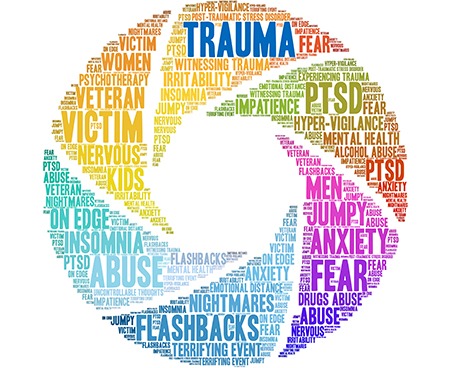Eye Movement Desensitization and Reprocessing (EMDR) is a gentle, neurobiological form of therapy that directly addresses and significantly reduces or eliminates the “fight, flight, or freeze response” in the brain caused by stress and trauma.
 Trauma can happen almost anywhere… or anytime.
Trauma can happen almost anywhere… or anytime.
Some types of trauma are obvious (“big T trauma”) – like physical and sexual assault, an unexpected loss, or a natural disaster.
But other trauma isn’t so “obvious” (“little T trauma”) – things like a vehicle accident, the end of a relationship, school or work bullying/harassment, misattunement with a caregiver in childhood, emotional neglect, moving (losing your social network), or witnessing violence at home or elsewhere.
Trauma can become deeply embedded in the body, causing stomachaches, headaches, migraines, pain, nightmares, panic attacks, and chronic illnesses.
Right now, memories of the traumatic event are the primary focus of your conscious and unconscious mind. Your thoughts are being filtered through the lens of those painful memories, effectively erasing the distinction between the past and the present.
 EMDR Intensives in Austin can help you rapidly process and let go of trauma.
EMDR Intensives in Austin can help you rapidly process and let go of trauma.
In the late 1980s, Francine Shapiro, Ph.D., discovered a connection between bilateral stimulation and upsetting memories when walking in the park (walking is a natural form of bilateral stimulation). Randomized clinical trials and case studies then confirmed this hypothesis. This led to the development of EMDR.
Our brains have a natural way of recovering from traumatic memories and events. This process involves communication between the amygdala (the alarm signal for stressful events), the hippocampus (where safety and danger memories are created and stored), and the prefrontal cortex (which controls behavior and emotion).
Some events are so upsetting that the normal communication between these areas becomes blocked and cannot be processed without help. This stress response is part of our natural fight, flight, or freeze response. When distress from a disturbing event remains, the disturbing images, thoughts, and emotions may create feelings of overwhelm, of being back in that moment, or of being “frozen in time.”
EMDR therapy helps the brain process these memories and allows normal healing to resume. The experience is still remembered, but the original event’s fight, flight, or freeze response is resolved.
EMDR begins with gathering history and identifying possible targets to work on. I then help prepare you by teaching you skills and techniques so that you learn how to contain disturbing thoughts and find ways that help you feel safe. We then use bilateral stimulation to begin desensitization. The goal is to bring the distressing material down to a 0 or 1 on a scale of 10. We then replace the old negative beliefs with a new positive belief the client has chosen they want to believe about themselves that goes along with the target we are working on.
The trauma or distressing material is processed using bilateral stimulation, which, similar to REM sleep, helps the right and left hemispheres of the brain process and integrate the difficult experiences. EMDR works to connect the memory into what is called the “adaptive neural network.” The traumatic blocks are removed, and the brain’s natural healing can begin. The memory becomes part of narrative memory. A bad thing that happened a long time ago has no power anymore.
EMDR can soothe you, improve your relationships, and heal your trauma.
What’s incredible is that EMDR can provide relief without forcing you to talk about the worst pain of your traumatic memories. This means that during processing, you are not required to verbally talk about your memories because your brain is doing all the processing. My job is to hold space for you while you process these memories and guide you to your new positive emotions.
When you reprocess painful memories…
You can permanently eliminate chronic symptoms like panic attacks, flashbacks, nightmares, intrusive memories, suicidal thoughts, self-injurious behaviors, anxiety, and emotional reactivity following traumatic or stressful experiences.
EMDR is also highly effective at targeting and removing long-standing “emotional blocks” like unhealthy thought patterns, compulsive behaviors, anxiety and depression, body image issues, phobias, and social anxiety.
You’ll also become more focused, centered, and at peace in your day-to-day life.
EMDR Intensives vs. Weekly Therapy: Why Choose an Intensive Format?
While weekly therapy sessions are valuable, EMDR Intensives offer distinct advantages for trauma healing:
EMDR Intensives
- Condensed timeframe (a few days)
- Continuous processing without weekly disruptions
- Deep immersion in the therapeutic process
- Fewer total sessions needed
- Rapid symptom relief possible
- Ideal for busy professionals
Traditional Weekly Therapy
- Extended process (months/years)
- Process interrupted by weekly gaps
- Less momentum between sessions
- More sessions over time
- Gradual improvement
- Requires consistent weekly commitment
My clients often report that the intensive format allows them to fully focus on their healing journey without the distractions of everyday life, leading to deeper insights and more transformative outcomes.
EMDR Intensive Options at True Mind Therapy
I offer flexible intensive session options to accommodate your unique needs and schedule:
Half-Day Intensives (3 Hours)
Perfect for:
- Processing a single traumatic memory
- Addressing a specific trigger or symptom
- Those new to EMDR who prefer a gradual approach
- Busy professionals with limited time availability
Full-Day Intensives (6 Hours)
Ideal for:
- Processing complex trauma
- Addressing multiple related traumatic experiences
- Those wanting to make significant progress in one day
- Visitors from outside Austin maximizing their time
Both intensive options can be scheduled as single sessions or arranged over consecutive days to create a customized treatment plan that aligns with your specific healing needs and goals.

Who Benefits from EMDR Intensives?
EMDR Intensives at True Mind Therapy are specifically designed for women dealing with:
Sexual Trauma
EMDR is particularly effective for healing sexual abuse trauma, allowing you to process painful experiences without having to verbally recount them in detail. This approach helps reduce shame, restore boundaries, and reclaim personal power.
Compulsive Behaviors
Many compulsive behaviors develop as coping mechanisms for underlying trauma. EMDR helps address the root causes of these patterns, creating space for healthier alternatives and greater freedom.
Other Trauma-Related Challenges
The EMDR process can effectively address numerous trauma-related issues, including:
- Anxiety and panic
- Relationship difficulties
- Self-worth struggles
- Career blocks
- Difficulty setting boundaries
- Emotional dysregulation
 If you’d like a more “intensive” EMDR experience…
If you’d like a more “intensive” EMDR experience…
Expect MASSIVE transformation. A way to heal from anxiety or trauma right now! I believe EMDR extended sessions/intensives are one of the most effective ways to heal quickly.
EMDR Intensives or “retreats” are designed for motivated individuals who want a lot of therapy in a short time. This unique approach offers a great choice for those with busy schedules or those who need relief quicker than traditional weekly sessions allow.
The great news is that EMDR Intensives are available for everyone and can be customized to fit your particular needs and schedule. I will design a plan to optimize and accelerate the treatment process, personalized for your specific needs, and will be your dedicated personal guide at every step.
When comparing Intensives compared to other trauma therapy, the intensive format may decrease treatment time because of time not spent on a) checking in at the beginning of each session, b) addressing current crises and concerns, c) focusing on stabilizing and coping skills that the client won’t need after trauma healing or d) assisting the client in regaining composure at the end of the session.
The True Mind Therapy Difference
What makes my approach to EMDR Intensives unique is the combination of professional expertise and personal experience. As someone who has personally walked the path of trauma recovery, I bring both clinical knowledge and genuine understanding to our work together.
My therapeutic approach integrates:
- Evidence-based EMDR techniques
- Trauma-informed care principles
- Internal Family Systems concepts
- Somatic awareness
- Spiritual integration (when aligned with your values)
- Practical tools for ongoing self-regulation
This comprehensive approach addresses trauma at multiple levels—cognitive, emotional, physical, and spiritual—creating opportunities for deep, lasting healing.
Your EMDR Intensive includes:
- Consultation and Assessment to assess whether EMDR is a good fit for your needs and identify the thoughts, beliefs, and emotions from which you are seeking relief.
- Personalized treatment workbook, and wellness kit
- A customized treatment program with targeted treatment goals. Intensives are anywhere from 2 to 6 hours long over multiple days. Intensives are scheduled with advance notice.
- Post-treatment interview to assess and support your adaption to positive changes from treatment and access any needed follow-up sessions.
- Intensives must be booked in advance, depending on availability. Session times and number of days vary depending on client needs.
How much does it cost?
Full-day, In person intensive: $2,100
This includes 90 minute assessment for gathering history and setting up targets, and 6 hours of therapy with a 1-hour break for lunch and stretch/bathroom breaks, as needed.
Half-day, Intensive: $1,200
This includes 90 minute assessment for gathering history and setting up targets, and 3 hours of therapy with one 15-minute break and additional stretch/bathroom breaks as needed.
*Individuals can attend In person Intensives in Austin,Texas or Virtual for half days.
The EMDR Intensive Experience: What to Expect
1. Thorough Assessment and Preparation
We begin with a comprehensive consultation to discuss your treatment goals, assess your readiness for intensive work, and determine if you’re a good fit for the intensive format. During this phase, I’ll also help you develop coping skills to ensure you feel prepared and supported.
2. The Intensive Days
During your intensive days, we’ll work together in a focused, supportive environment to process traumatic memories using the EMDR protocol. Unlike traditional talk therapy, EMDR doesn’t require you to repeatedly discuss painful details of your trauma. Instead, your brain does the processing work while I guide you through the experience.
Each intensive session includes:
- Targeted EMDR processing
- Integration periods
- Skill-building for emotional regulation
- Personalized guidance throughout the process
3. Integration and Follow-Up
After your intensive, I provide support to help you integrate your experiences and solidify the changes you’ve made. Many clients find that a single follow-up session helps to address any questions that arise as they apply their new insights to everyday life.
 I believe in EMDR because it changed my life!
I believe in EMDR because it changed my life!
After years of talk therapy and feeling stuck in my head, constantly analyzing myself, and frustrated with nothing changing, I found EMDR.
After five months of EMDR, I found incredible healing and let go of big pieces of my trauma, allowing me to feel peace, joy, and control of my life. I learned I could create the life I wanted without carrying around 1000 lbs. of trauma. I released the pain that had been buried deep for so long.
It changed my life so much that I couldn’t wait to learn and practice EMDR to help others the way it helped me!
Stop the cycle of fear and begin living confidently again!
Let’s get healed!
There is no reason to sit in your pain any longer. Call me at (209) 791-6191 to set up a free 30-minute consultation to discuss your needs and see if we are a good fit to work together.
*Names changed to preserve client confidentiality.
Transformative Results: What’s Possible with EMDR Intensives
While everyone’s healing journey is unique, clients who complete EMDR Intensives often experience significant shifts, including:
- Freedom from trauma symptoms that may have persisted for years
- Greater emotional regulation and stress resilience
- Improved relationships with yourself and others
- Enhanced self-confidence and authentic self-expression
- Clearer decision-making without trauma-based fear
- Reduced or eliminated compulsive behaviors
- More present enjoyment of everyday life
The beauty of EMDR therapy is that these changes tend to be lasting because they address the root causes of symptoms rather than simply managing them.
Begin Your Healing Journey with EMDR Intensives in Austin
If you’re ready to transform your relationship with trauma and step into a more empowered, peaceful life, I invite you to explore EMDR Intensives at True Mind Therapy in Austin.
As a woman who specializes in women’s trauma healing, I create a therapeutic space where you can feel truly seen, understood, and supported on your healing journey. Together, we’ll work to release what no longer serves you and reconnect with your authentic power and joy.
Frequently Asked Questions About EMDR Intensives
How quickly will I notice results?
Many clients experience noticeable shifts during or immediately after their intensive session. While everyone’s process is unique, the concentrated format often allows for more rapid progress than traditional weekly therapy.
Will I need to discuss all the details of my trauma?
One of the benefits of the EMDR process is that it doesn’t require you to verbally recount the details of your trauma. While some context is helpful, the focus is on processing the emotional and sensory components rather than telling the story repeatedly.
How should I prepare for an EMDR Intensive?
I recommend clearing your schedule completely on intensive days, arranging for support afterward if needed, practicing self-care in the days leading up to your intensive, and getting adequate rest before your session. I’ll provide more specific guidance during our initial consultation.
How does EMDR compare to talk therapy?
While talk therapy focuses primarily on verbal processing and cognitive insights, EMDR works directly with the brain’s information processing system. This neurobiological approach often leads to faster, more profound shifts, particularly for trauma-related issues.
Will I receive materials to support my healing?
Yes, you’ll receive a personalized treatment workbook with resources to support your healing journey before, during, and after your intensive experience.


 Trauma can happen almost anywhere… or anytime.
Trauma can happen almost anywhere… or anytime. EMDR Intensives in Austin can help you rapidly process and let go of trauma.
EMDR Intensives in Austin can help you rapidly process and let go of trauma.
 If you’d like a more “intensive” EMDR experience…
If you’d like a more “intensive” EMDR experience… I believe in EMDR because it changed my life!
I believe in EMDR because it changed my life!